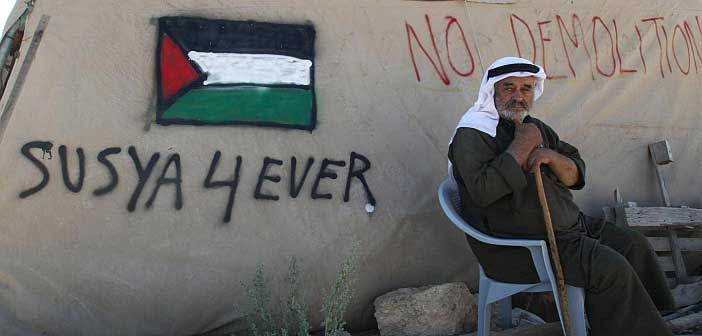International call to stop Israel destroying a Palestinian village, leaving 100 people exposed to freezing winter rain and harsh winds.
Source: The Independent
Israel is about to “commit a war crime” and leave 50 Palestinian children homeless in freezing winter conditions by demolishing a large chunk of their West Bank village, it has been claimed.The Village Council of Susiya in the Israeli-occupied West Bank has now written an open letter pleading for the international community to exert pressure to stop the demolition, which is now thought to be just days away.
The villagers say the demolition of 20 buildings, one fifth of the village, will “violate the fundamental human rights” of 100 people, half of them children, and leave them “exposed to freezing rain and harsh winds.”
Claiming the plan to demolish Susiya is part of a wider “extensive campaign of [Israeli] demolitions in the West Bank”, the villagers’ letter concludes: “The Israeli government has repeatedly violated its obligations to us as protected persons living under occupation.
“It will be a war crime if the Israeli government forcefully displaces our village.”
The Israeli authorities have long viewed Susiya as an illegal encampment but the demolition order, announced by the Israeli State Attorney’s Office on 22 November, has also been condemned by a group of US Senators including Bernie Sanders, and by EU diplomats.
On 24 November the EU Representative and the EU Heads of Mission in Jerusalem and Ramallah issued a joint statement citing Israel’s humanitarian legal obligations as “an occupying power” and demanding the demolition be halted.
Declaring themselves “deeply concerned” about the Susiya demolition plan, the diplomats said: “The EU calls upon the Israeli authorities to halt demolitions of Palestinian houses and property, in accordance with its obligations as an occupying power under international humanitarian law, and to cease the policy of settlement construction and expansion, of designating land for exclusive Israeli use and of denying Palestinian development.”
Susiya is located in the South Hebron Hills within Area C of the West Bank, where all civil and security affairs are run by the Israel Defence Forces (IDF) through its Civil Administration, as set out in the 1993 Oslo peace accords.
It has been a source of growing tension since 1986 when the site of the original village was declared a national park because of its archaeological heritage, which included an ancient synagogue that was later converted into a mosque.
Supporters of the villagers say at that point they were expelled from their original homes and took to living on their adjacent agricultural lands.
Throughout the Nineties, the IDF carried out small-scale demolitions of homes at the new site of Susiya, claiming they had been built illegally.
In July 2001, according to The Times of Israel, the entire village was destroyed a day after the murder of Yair Har Sinai, a shepherd from the nearby Jewish settlement, which is also called Susiya.
The Palestinians later rebuilt. The villagers submitted a development plan for Susiya in 2012, but in October 2013 this was rejected by the Civil Administration’s Subcommittee for Planning and Licensing.
The committee was said to have ruled that the rural residences built by the Palestinians did not provide them with proper chances for social advancement, job opportunities or educational empowerment. The committee also argued that the Palestinian Authority and the nearby town of Yatta were unable to provide proper educational, welfare and health services to Susiya.
It allegedly claimed the plan submitted by the villagers would keep Susiya’s 350-strong population in “poverty and ignorance”, and suggested that they integrate into the urban fabric of Yatta instead.
The ruling was condemned by the organisation Rabbis for Human Rights as “especially cynical considering the regime authorities placed obstacles in the way of building a school [and]left it for decades without infrastructure for electricity, water, sewage, and roads.”
In their letter, the villagers say the 2013 rejection of their plan left them “no choice but to remain on our land living in tents, under very difficult conditions, forbidden from building or repairing anything, in order to protect our land from the threat of annexation by the surrounding [Jewish] settlements.”
Then in 2014 Regavim, which calls itself a legal advocacy NGO but is characterised by opponents as a right-wing pro-Jewish settler group, began lobbying the Israeli High Court to demolish Susiya.
Open letter signed by politicians, artists, academics, unions and other international voices…

